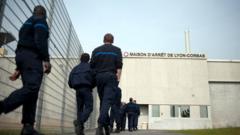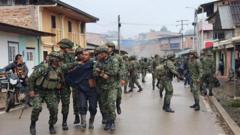Despite longstanding efforts to dismantle organised crime in Sicily, recent police actions highlight the Mafia's adaptability, reliance on technology, and persistence in activities like drug trafficking and online gambling.
The Evolving Face of Sicily's Mafia Amidst Law Enforcement Crackdowns

The Evolving Face of Sicily's Mafia Amidst Law Enforcement Crackdowns
Recent police operations reveal the changing landscape of Sicily’s Mafia, as members grapple with modern criminality and technology while contending with increased scrutiny.
Empty line 4
As law enforcement agencies intensify their efforts against organized crime in Sicily, the local Mafia appears to be evolving to meet the challenges of modernity. In a recent operation, anti-mafia police arrested 181 suspected gangsters across Palermo in a bid to disrupt reformation efforts aimed at establishing a new governing body within the notorious Cosa Nostra. Reports from the investigations indicate a notable shift in the mafia's operational methods.
Mafioso Giancarlo Romano, recorded before his murder last year, lamented the decline in quality among new recruits. His wiretapped conversations reflect a longing for the high-stakes crimes of the past, contradicting the Mafia's current focus on lower-level drug profits, as he disparagingly described today’s mafia as lacking substance compared to previous generations.
The investigation has unveiled that the contemporary Sicilian Mafia now heavily relies on encryption technology to evade law enforcement. Investigators discovered that gang members employed encrypted mobile phones and a myriad of short-life micro-SIM cards to coordinate illicit activities including drug trafficking, money laundering, and online gambling. Notably, they have begun collaborating with other criminal groups, like the larger 'Ndrangheta, expanding their operational networks across Italy.
Anti-mafia prosecutor Maurizio de Lucia emphasized that even though Cosa Nostra has faced significant setbacks over the last three decades, it remains a formidable force. He reported that among the arrested, a significant number were relatively young, with half of the suspects aged in their twenties and thirties. Yet, the underlying codes and traditions of the Mafia endure; as one gangster remarked in a recording, joining Cosa Nostra is akin to a lifelong commitment, with no prospect of exit.
The relentless crackdown has also underscored vulnerabilities within Italy's high-security prison system, where gangsters have maintained influence and operations. One prominent incident detailed a gangster remotely viewing a beating he orchestrated while incarcerated, illustrating the deep-seated challenges authorities face in curtailing mafia activity.
Prime Minister Giorgia Meloni's praise of the operation and her commitment to the continuous fight against the Mafia signify the ongoing struggle between law enforcement and organized crime in Sicily. While the Mafia may have adopted more contemporary tactics, the essence of its rebellious spirit remains rooted in a culture that one seasoned mobster has equated with marriage — an institution one cannot simply leave.
As law enforcement agencies intensify their efforts against organized crime in Sicily, the local Mafia appears to be evolving to meet the challenges of modernity. In a recent operation, anti-mafia police arrested 181 suspected gangsters across Palermo in a bid to disrupt reformation efforts aimed at establishing a new governing body within the notorious Cosa Nostra. Reports from the investigations indicate a notable shift in the mafia's operational methods.
Mafioso Giancarlo Romano, recorded before his murder last year, lamented the decline in quality among new recruits. His wiretapped conversations reflect a longing for the high-stakes crimes of the past, contradicting the Mafia's current focus on lower-level drug profits, as he disparagingly described today’s mafia as lacking substance compared to previous generations.
The investigation has unveiled that the contemporary Sicilian Mafia now heavily relies on encryption technology to evade law enforcement. Investigators discovered that gang members employed encrypted mobile phones and a myriad of short-life micro-SIM cards to coordinate illicit activities including drug trafficking, money laundering, and online gambling. Notably, they have begun collaborating with other criminal groups, like the larger 'Ndrangheta, expanding their operational networks across Italy.
Anti-mafia prosecutor Maurizio de Lucia emphasized that even though Cosa Nostra has faced significant setbacks over the last three decades, it remains a formidable force. He reported that among the arrested, a significant number were relatively young, with half of the suspects aged in their twenties and thirties. Yet, the underlying codes and traditions of the Mafia endure; as one gangster remarked in a recording, joining Cosa Nostra is akin to a lifelong commitment, with no prospect of exit.
The relentless crackdown has also underscored vulnerabilities within Italy's high-security prison system, where gangsters have maintained influence and operations. One prominent incident detailed a gangster remotely viewing a beating he orchestrated while incarcerated, illustrating the deep-seated challenges authorities face in curtailing mafia activity.
Prime Minister Giorgia Meloni's praise of the operation and her commitment to the continuous fight against the Mafia signify the ongoing struggle between law enforcement and organized crime in Sicily. While the Mafia may have adopted more contemporary tactics, the essence of its rebellious spirit remains rooted in a culture that one seasoned mobster has equated with marriage — an institution one cannot simply leave.




















